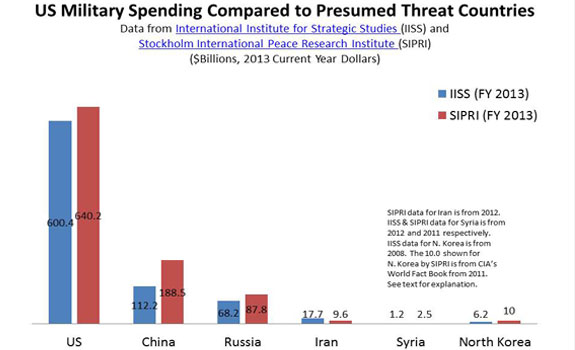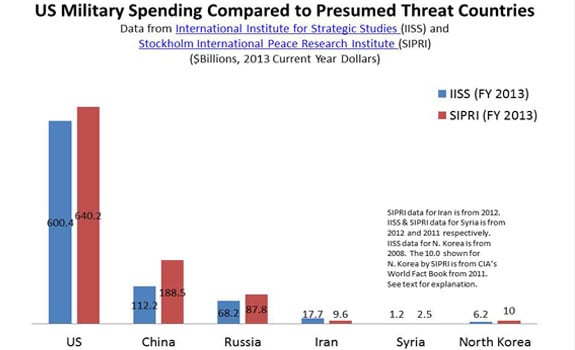
Part of the Series
Solutions
In August of 2012, I wrote a column on a chart of US military spending in constant dollars, which showed that the United States was spending above the levels of all its recent wars, except for World War II. I urged readers to look at it and pass it on, to show others that the defense budget was way too high and that calls for ending any reductions were based on fear, not facts. Having investigated the Pentagon for 35 years, I am so frustrated about excessive, destructive and ineffective defense spending that I plan to ask Truthout readers to pass on these Department of Defense (DOD) spending truths several times a year.
So, look at this chart carefully:

The chart makes it starkly clear that the Pentagon and Congress are ringing false alarm bells when they say that the DOD can’t make any sequestration cuts, as other areas of the government are doing. This chart, which was prepared by Winslow Wheeler of Project On Military Procurement (POGO) in a blog post, shows that we are grossly spending more than all our perceived enemies combined. (Disclosure: I am the founder of POGO and serve on its board of directors.) Wheeler explains the excess this way:
To support its world-wide empire at the turn of the 19th century, Great Britain adopted the “two power standard,” which called for the Royal Navy to be equal to the combined strength of the next two largest navies in the world. The United States has more than doubled that standard as regards budgets, and yet our politicians and senior defense officials complain such outspending is inadequate.
Our military budget has grown way beyond that which the British used as a yardstick while they were trying to control an empire where the sun never set. Yet the alarm bells continued as the House of Representatives marked up and debated the FY 2015 budget. The chairman of the House Armed Services Committee, Rep. Howard “Buck” McKeon (R-Calif.), thinks we are ruining our national defense capacity with even partial cuts and told the Heritage Foundation in a recent speech, “In next year’s bill, we’re going to have to whittle our ‘big stick’ down to a twig.”
One look at this chart makes you wonder if McKeon could ever get his mind out of the military industrial congressional complex’s principle of spend, spend, spend, under which even a cut in the increase we give the Pentgon every year causes great wailing and gnashing of teeth. (My past column on how McKeon games the system for his own game can be found here.)
The new chairman of the House Appropriations Committee’s Subcommittee on Defense (HAC-D), Rep. Rodney Frelinghuysen (R-NJ), is also screaming about the fact that we are going to retire the account that separately funds our war efforts as we are getting out of Afghanistan. The Overseas Contingency Operations (OCO) fund has been used since the original invasions of Afghanistan and Iraq to fund the wars off the books of the normal DOD budget. According to Defense News:
“You know, for a while people were discounting the need for our basing in Germany,” Frelinghuysen told Defense News. “And now people say, ‘Wait a second here. Putin is spitting in the president’s eye. Maybe we need to take a look at our military posture in Europe’.”
To the new HAC-D chairman, that means “we will always need some ability to provide supplemental dollars.”
“We will need some sort of an account,” he said. “I am not sure what we will call it.”
How about calling it the Perpetual War Fund? Now that we are leaving Afghanistan, God help the Pentagon if it has to give up its $85 billion-or-so-a-year war fund because we aren’t suppose to be at war after leaving the Afghanistan. This constant, year-after-year manipulation of the DOD budget since World War II has lead to US military spending being much higher than the rest of the world’s spending – in fact, US military spending is about as much of the rest of the world’s military spending combined.
But that isn’t good enough for the Pentagon and its fellow travelers. Using the new Putin threat, there is a push by the US government to pressure its NATO allies into spending more of their money on their military budgets.
From The Washington Post:
NATO members will be “judged harshly” if they do not increase defense spending in response to the challenge now posed by Russia, Defense Secretary Chuck Hagel told US allies Friday.
. . . NATO’s “lopsided burden” has fallen disproportionately on the United States, Hagel said. “Today, America’s GDP is smaller than the combined GDP’s of our 27 NATO allies, but America’s defense spending is three times our Allies combined defense spending,” he said.
Although Hagel did not mention it, much of US spending has come about as a result of three wars – two in Iraq and one in Afghanistan – in which NATO only partially participated.
Maybe our allies are smart enough to know what happens to a country’s economy and well-being when that country robotically dumps money into its military coffers whenever there is a dispute in the world. We should be learning from them instead of lecturing them. They are resisting throwing money into their military in hopes of somehow scaring Putin off his game of chicken. Do we really believe that the US and NATO will stage a ground war with Russia in Europe, where both sides have tactical nuclear weapons? We knew that would not happen during the Cold War, and everyone who wants to do this knows that we would not risk a tactical nuclear war now. But it is good for the war business, and I doubt that we would cut any of our military budget even if our allies would raise theirs.
Most people won’t admit in polite company that they think war and the required spending for it through military budgets is good for the country. However, Ian Morris, a classics professor at Stanford University, wrote an opinion piece for The Washington Post with the theory that war was the most important thing in the advancement of civilization and prosperity:
War may well be the worst way imaginable to create larger, more peaceful societies, but the depressing fact is that it is pretty much the only way. If only the Roman Empire could have been created without killing millions of Gauls and Greeks, if the United States could have been built without killing millions of Native Americans, if these and countless conflicts could have been resolved by discussion instead of force. But this did not happen. People almost never give up their freedoms – including, at times, the right to kill and impoverish one another – unless forced to do so; and virtually the only force strong enough to bring this about has been defeat in war or fear that such a defeat is imminent.
Let us hope that the majority of our citizens aren’t so greedy as to think that is the way to advance society. Has this professor ever bothered to study diplomacy?
My mentor and famous Pentagon whistleblower Ernest Fitzgerald was told in the 1980s that the military budget and wars made jobs. He replied that so did hurricanes, drug overdoses, floods, and other natural and manmade disasters, but these activities were not something you should use in your national plan to make jobs. Wars and threats of wars are also not something you should plan on to boost your economy. Not many of the people that advocate this would send their sons and daughters into a dead-end “military action” or want their neighborhood or local gathering spot to be hit by drones, killing their spouses, kids or neighbors because the United States needed to make jobs.
But the military congressional industrial complex has good and highly effective public relations to keep pushing this spending on our war-weary nation. The top brass always bonds itself tightly to the troops, claiming that more money is necessary to get the “best for our boys.” The Pentagon civilian leaders and the generals, when faced with cuts, always find a way to say that they have to cut soldier benefits to be able to claim that anyone who wants to cut the budget or even cut the increase don’t love our troops.
They have now found a new boogeyman now that Saddam Hussein and Osama Bin Laden are gone. Putin is the new face of the old Russian bear in the woods that Ronald Reagan used to scare us into his military buildup. Cut the budget or even cut the increase? What other bureaucracy can claim a grip on our budget by saying that if we don’t go along with its charade, we could all die.
The military is asking us once again to keep this massive national spending going, even though it cannot pass an audit or find or control its money in paying its contracts. The Pentagon budget, by the department’s own admission, is mostly “unauditable,” a awkward word that means that it, either by negligence or design, can’t follow the billions of dollars we send it every year.
This is a major macro problem that continues decade after decade. The Pentagon is selling it because we, as a nation, are buying it – whether it’s because of apathy, ignorance, fear or tacit approval. Most Americans haven’t seen this chart. They don’t know how much we spend on our military; while our allies invest in supertrains and other infrastructure, our country’s basic foundations crumble.
The solution to get control of the Pentagon is to cut its fuel line – the budget. We won’t have the political will to do so until people realize that we are spending much more than we need to spend. People who do realize what is going on feel helpless to do anything about it.
However, if we could get this chart to go viral, like the video of the dog who bites his own leg or the cat in a shopping bag, maybe we could start to put a dent in our tacit acquiescence to this fraudulent and excessive budget that supposedly keeps us safe. I am asking you to send this chart along to your family and friends and ask them to do the same. If we don’t inject some logic and comprehension into the debate on military spending, we will continue to damage the well-being of our country and the world. Will you spend a few minutes on a cut, paste and send?
Join us in defending the truth before it’s too late
The future of independent journalism is uncertain, and the consequences of losing it are too grave to ignore. To ensure Truthout remains safe, strong, and free, we need to raise $50,000 in the next 10 days. Every dollar raised goes directly toward the costs of producing news you can trust.
Please give what you can — because by supporting us with a tax-deductible donation, you’re not just preserving a source of news, you’re helping to safeguard what’s left of our democracy.